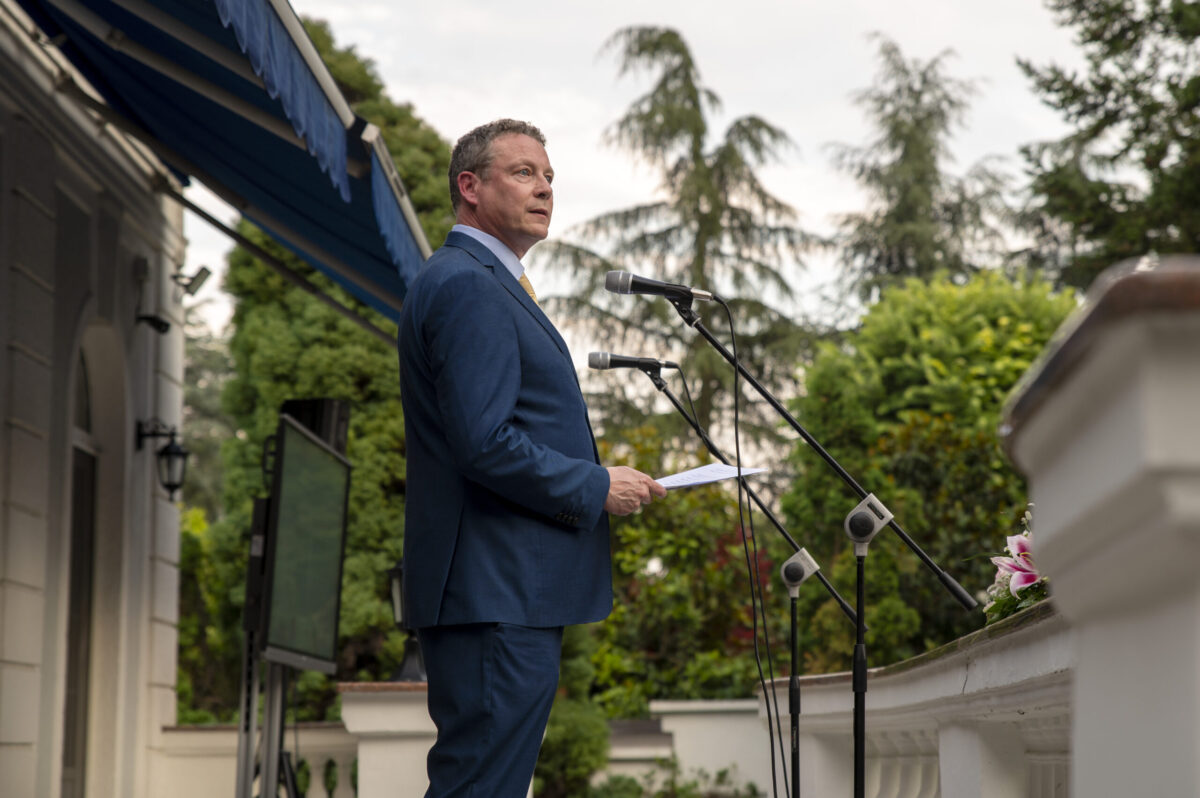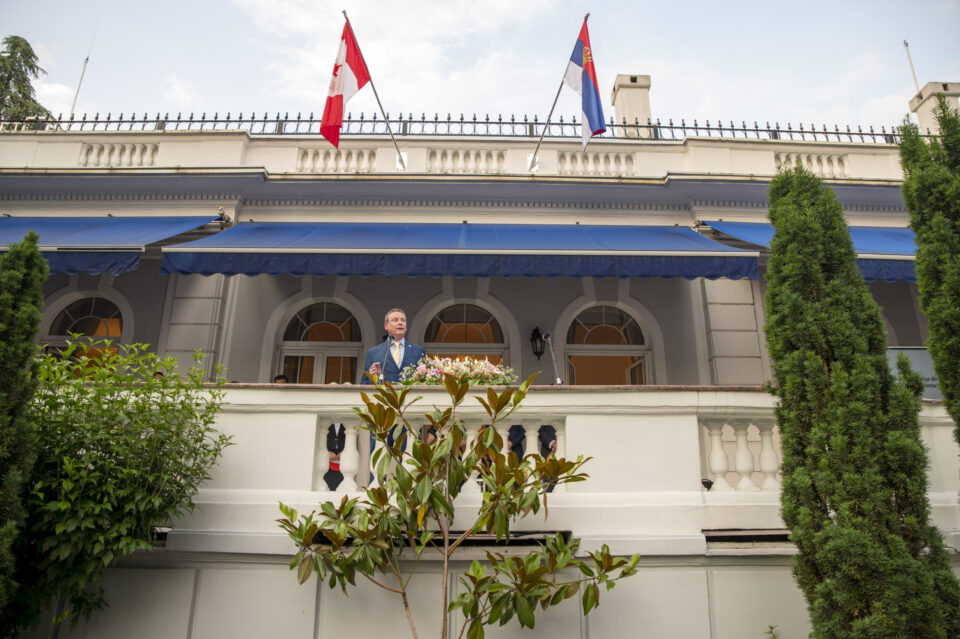
On the occasion of Canada Day, a national holiday celebrating peaceful Canadian history and traditional and modern values, we spoke with H.E. Giles Norman, Canadian ambassador to Serbia.
Canada Day is a day of national pride and patriotism. As a Canadian, how do you feel on that day, and what are the main Canadian values you’re proud of?
I’m always conscious of how lucky I am, frankly. Canada is blessed by geography, and it is blessed by its nature and resources: yes, we turn those to our advantage, but at the base, those are Canadians’ great, good luck. I’m proud and grateful too to our political organization that, from its earliest days, drew from the best of the British and continental European traditions and tailored them to our particular circumstances. It has been able to adapt and keep our country on course — indeed, thriving — over the past century and a half of extraordinary global change and challenge. Our political tradition is based on the dignity of the individual. And it’s also based on the observation that, to thrive, individuals need peace, order, and good government. I’m proud of this “founding wisdom” that these two elements are, and should be, dynamic, positive, creative, and tension, rather than one privileged over the other. It serves us well. If I have to choose one value to emphasize, it might be diversity. In truth, this is both a value and a strategy. It’s a value in that the individual is at the center. It’s a strategy in that we think diversity of views and of peoples is a source of strength, even a comparative advantage. It refreshes and invigorates us. It makes us cosmopolitan, and dynamic, and it makes us a magnet for spirited, ambitious people. I’m proud of Canada’s affirmation of the individual, and our celebration of diversity.
How would you describe the current state of diplomatic relations between Canada and Serbia, and what are the key areas of cooperation between the two countries?
I just had an opportunity to reflect on this upon our celebration of our National Day, at which I emphasized our many, and proliferating, bilateral relationships. These connections are getting stronger on the sports field. They are strengthening in the fields of literature, culture and the performing arts. I spoke of the contributions that over 100,000 Serbians in Canada make to our country’s cosmopolitanism and dynamism. I emphasized too that Canada and Serbia are deepening our connections every day through our joint work in vital economic fields such as women and STEM, energy and extractives, in information and communication technology, and AI. Another stand-out connection – and one of the most rewarding – is with Serbia’s civil society. These are people and groups who forfeit the easy way, and choose to engage in making their communities more vibrant, to help their society’s most vulnerable, and to honour and defend their fellow citizens’ dignity and rights. These connections and relationships, across these and many other aspects, are making our bilateral relations stronger every day. Diplomatic relations are state-to-state relations, and are governed by centuries-old protocol and codes of conduct and well-established principles. The key areas of cooperation are spelled out in briefing notes, and web-pages and spreadsheets. I’m deliberately focusing on Canada and Serbia’s bilateral relationships. These constitute the flesh and blood of our bilateral relations, and they are vigorous, expanding, inspiring.
Over 100,000 Serbians in Canada make to our country’s cosmopolitanism and dynamism
Canada has actively supported Serbia’s EU accession process. What role does Canada play in assisting Serbia’s path toward European integration, and what are the main challenges and opportunities in this regard.
To be clear, Canada does not play a direct part in Serbia’s EU accession process. And it is not for Canada to tell Serbia, or the EU, what either of you should do. We know how complex such negotiations can be, having negotiated comprehensive Free Trade Agreements with both our North American and European partners. That said, we do know that it is in Canada’s interest – broadly understood — that Serbia finds its place in the EU. And many of the things that bring that prospect closer are also good for Canada, and for Canada and Serbia bilaterally, and, we believe, good on their own terms for Serbia and Serbs. We try to focus our efforts on where those circles intersect. Broadly speaking, that means working with Serbia and our other partners in the area of peace and security, because we believe regional security is a pressing imperative. We also work together with Serbia to enhance economic prosperity, including through the sharing of good practices. Canadian firms in Serbia –- in Information and Communication Technology, Energy and Extractives, Artificial Intelligence, the automotive sector or what-have-you — adhere to the highest standards of corporate governance, environmental safeguards and community engagement; indeed, Canada is recognized as a world leader in Responsible Business Conduct (RBC). We also collaborate with Serbia to encourage more women to contribute in STEM fields, where Serbia is already in the vanguard. The Embassy also engages directly and indirectly to support Serbian democracy and good governance, gender equality and environmental improvement, including through our modest but well-regarded Canada Fund for Local Initiatives. These are areas that are good for Serbia, and Canada, and impel Serbia along the EU accession path.

Canada and Serbia share a strong trade relationship. Could you highlight some of the key sectors where Canadian companies have invested or are interested in investing in Serbia and what potential exists for further economic collaboration?
The moment you land in Serbia, waving a Canadian passport, people relate you to mining and start talking about critical minerals, environment protection and electric vehicles. And rightfully so, as Canada holds global leadership in the mining industry and Serbia may have an integral role in development of European industries such as critical minerals extraction and batteries and e-vehicles production. Canada’s vast territory is rich in natural wealth, including critical minerals such as; nickel and cobalt. Our government, businesses and people understand that mining industry is not an isolated island, but an integral factor — essential if you may — in building sustainable economies and a sustainable future. Naturally, we want to support Serbia in developing its mining and energy ecosystem on the principles of environmental, social and governance responsibility and transfer our expertise and experience to local government and people. But we see rising opportunities in other segments of economy. For example, Serbia is rapidly becoming a new ICT hub in South Eastern Europe. The evidence of that is the increased interest that Canadian companies show in establishing their business presence here. They recognize Serbia’s rich ICT talent pool, “let’s do it” attitude and compliance with Western business culture. I’ve welcomed several of them to Belgrade in 2023 only and our trade department receives almost weekly interest from our companies in opportunities in this market. From IT engineering, artificial intelligence and machine learning to cyber security, biotech and gaming, there are expanding opportunities for close cooperation between Canada and Serbia in coming years. We also see significant opportunities in the aerospace, agriculture and the energy sector. In short, these are exciting times for us.
The Embassy supports small local projects in Serbia through our “Canada Fund for Local Initiatives
Canada has been known for its commitment to human rights and multiculturalism. How does the Canadian Embassy in Serbia promote these values and work towards strengthening democratic institutions, civil society, and the rule of law in the country?
We try to share our experiences and values, respecting of course that – engaged as we are in this country and its future — we are visitors here. The Embassy builds and sustains partnerships with both the government and civil society organizations, directly and in partnership with others, and bilaterally as well as at the regional and global levels. Perhaps most concretely, the Embassy supports small local projects in Serbia (and in Montenegro and North Macedonia), through our “Canada Fund for Local Initiatives”. Through this program, we work with civil society partners on projects related to inclusive governance, peace and security, gender equality, and the environment. Our connection with Serbia’s civil society on this range of issues is one of the most rewarding connections we are forging. We get to work with engaged citizens who know they have a stake in their communities and country, and dedicate themselves to making them better.
Climate change is a pressing global issue. How is the Embassy of Canada collaborating with Serbia to address climate change challenges, promote sustainable development, and encourage the transition to clean energy sources?
Canada is custodian of the world’s largest intact boreal forest, and of a mind-staggeringly large Arctic expanse, each home to delicate ecosystems and communities, and each of global environmental significance. As I write, the forests are burning and the ice cap is melting. That tends to focus the mind. Canada, as a signatory of the Paris Agreement wants to lead the global efforts in addressing climate change and empower the transition to clean energy including hydro, wind, solar, green hydrogen and nuclear energy. In 2022 our Government adopted “The 2030 Emissions Reduction Plan” to achieve its target of reducing emissions to 40-45% below 2005 levels by 2030. This Plan includes CAD9.1 billion in new investments and measures to help Canadian citizens and industry transit towards truly sustainable economy. The final, ambitious goal of Prime Minister Trudeau’s government is to reach net-zero emissions by 2050. A number of provinces and cities have already made net-zero-by-2050 commitments, including Guelph, Vancouver, Hamilton, Toronto, Halifax, Newfoundland and Labrador, and most recently Quebec. Most of provinces in Canada, including Quebec and Ontario, have managed do decarbonize their electricity production by completely abandoning coal and switching to hydro energy, renewables and nuclear energy. Globally, Canada and UK lead the “Powering Past Coal Alliance”, which empowers coal-dependant countries to smoothly transition towards sustainable energy production by increasing the share of green energy sources. Canada has invited Serbia to consider joining this initiative, which would allow Serbia to benefit from the expertise and experience of other countries struggling with similar challenges.
People-to-people connections are vital in fostering understanding and cooperation between nations. What cultural and educational initiatives does the Canadian Embassy undertake to enhance cultural exchange, promote Canadian values, and strengthen ties between the people of Canada and Serbia?
Cultural cooperation between Canada and Serbian continues to be important to our bilateral relations. We are proud that over 350 Canadian titles have been translated into Serbian, a tribute to Serbian publishers’ vivid interest in books by Canadian authors and their multicultural influences. Canadian publishers not only promote literature here, but also participate in workshops on how to resolve copyright issues, new trends for electronic and audio books, and many others. Canadian playwrights feature in the repertoire of Serbian theatres; Canadian films and documentaries grace this country’s film festivals; and so on. The Embassy’s links to the vibrant Serbian arts scene here has enabled command performances by the celebrated Les Ballets Jazz de Montreal, concerts featuring Serbian-Canadian clarinettist Milan Milošević, the a capella opera “Svadba-Wedding” by famous Serbian-Canadian Ana Sokolović, literary evenings with Canadian writers Margaret Atwood, Nita Prose and many others. And the flow is absolutely in both directions. Canadians benefit from the outsize cultural contributions of Serbian-Canadians such as the writer David Albahari, the illustrator Dušan Petričić and the multimedia artist Vessna Perunovich, many of whom maintain a foothold in both our countries. Canada is made stronger by our ability to attract such exceptional people from Serbia. In the academic realm, the Serbian Association for Canadian Studies (SACS) has been active for over twenty years in promoting Canadian values through academic activities such as round tables and international conferences. Four Serbian universities include Canadian studies in their curricula. And for our part, Canada offers scholarships for postgraduate Serbian students who can choose from among 10,000+ programs at Canadian universities and colleges all over Canada.
Air Serbia‘s expansion plans for North America give us hope that one day we will be able to fly directly from Toronto to Belgrade
A few years ago, the two countries signed the Agreement on Air Travel, but still, there are no direct routes. What’s the obstacle if we know that both Air Serbia and Air Canada are interested in direct flights between Belgrade and Toronto?
Serbia continues developing its reputation as the regional aviation center in Southeast Europe. The development of the Nikola Tesla Airport‘s capacities and the increase of Air Serbia‘s fleet are unmatched in the region. As you said, in 2018 Canada and Serbia signed an Air Transportation Agreement, a prerequisite for the introduction of direct flights between our countries. Air Serbia‘s expansion plans for North America give us hope that one day we will be able to fly directly from Toronto to Belgrade. I would leave it to Air Serbia experts to determine if and how the introduction of the direct flight would support the company’s business plans in the mid- and long-term. From our perspective, there is a strong interest in the introduction of this flight from our Serbian diaspora and from those who recognize Serbia as a principal business and tourism hub at the heart of Southeast Europe. For my part, I would love it if our work to make this happen bears fruit – maybe even during my time here as Ambassador!
